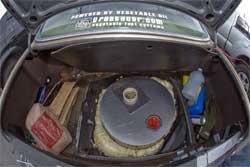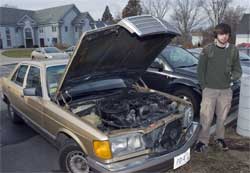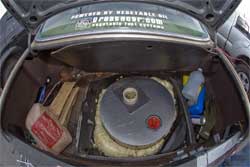 KINGSTON, R.I. — February 1, 2007 — When University of Rhode Island student Nick Russell needs fuel, he drives his 1985 Mercedes past gas stations and stops at the Two Little Fish restaurant in Westerly. There, the 19-year-old fills a 50-gallon plastic drum with free, discarded soybean oil and drives home. He filters some of the oil over his parents’ backyard fire pit and pours it into his car.
KINGSTON, R.I. — February 1, 2007 — When University of Rhode Island student Nick Russell needs fuel, he drives his 1985 Mercedes past gas stations and stops at the Two Little Fish restaurant in Westerly. There, the 19-year-old fills a 50-gallon plastic drum with free, discarded soybean oil and drives home. He filters some of the oil over his parents’ backyard fire pit and pours it into his car.
His car doesn’t run on veggie power alone. It must run on diesel fuel for the first five miles of any trip. The sophomore gets 29 miles per veggie gallon and 28 miles per gallon on his diesel fuel.
“When I asked the restaurant owners if I could take away their used oil, they just kinda looked at me and asked me to repeat the question,” the Hopkinton resident says with a smile, noting that a restaurant generally has to pay a company to truck away its waste.
A member of the Renewable Energy Club on campus, Russell is motivated. “We have to preserve the planet. Vegetable oil is free and it’s clean,” he explains. “And using alternative fuels makes the country less dependent on foreign oil. 
“The car doesn’t smell like French fries when I drive down the street either,” he adds. “It’s a sweet smell.”
The sophomore had to convert his diesel engine car to run on the veggie oil. He bought a conversion kit online from greasecar.com for $800. It looked complex, but after five months working side by side with his father Joel Russell, the veggie vehicle was good to roll. “It takes time,” the young recycler says, “and a bit of patience, but I’m pretty sure my dad wants to get one now.”
Russell proudly pops open his car’s hood and trunk, revealing a maze of wires, switches, tubes, storage tank, and hoses. He opens the driver’s side and points to his dashboard controls that switches from diesel to soy.
Although the Mercedes’ odometer reads 237,000 miles, Russell feels it has many miles to go. “I’ll get my money back,” he says with confidence.
Russell studies German at URI and is uncertain of his future career path. It might be in Germany. The country, he says, has an emerging alternative energy program.
URI News Bureau Photo by Michael Salerno Photography.

